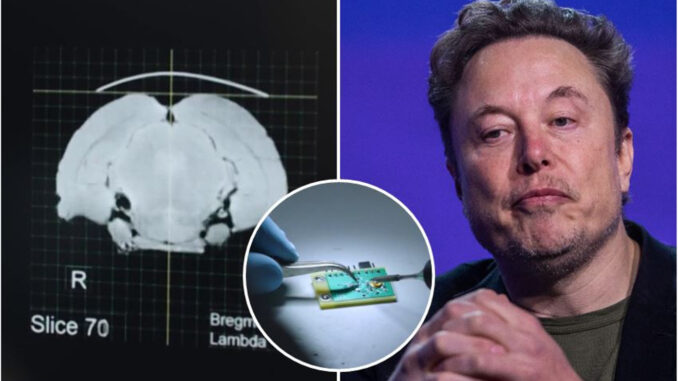
Elon Musk’s Neuralink was aware that its brain implant was likely to malfunction in its first human patient, but went ahead with the surgery anyway, according to a new report.
In January, the firm implanted a brain chip in its first patient, Noland Arbaugh, who was paralyzed from the shoulders down due to a 2016 diving accident. Weeks after the procedure, some of the device’s wires pulled away from his brain, the company said last week.

BYPASS THE CENSORS
Sign up to get unfiltered news delivered straight to your inbox.
You can unsubscribe any time. By subscribing you agree to our Terms of Use
Latest Video
Now, a report by Reuters claims that Neuralink had known about this issue ‘for years’ following animal testing.
Despite this, they deemed the risk low enough for a redesign not to be merited.
The Mail Online reports: Neuralink is testing its implant to give paralyzed patients the ability to use digital devices by thinking alone – a prospect that could help people with spinal cord injuries.
The company said last week that the implant’s tiny wires, which are thinner than a human hair, retracted from a patient’s brain in its first human trial, resulting in fewer electrodes that could measure brain signals.
The signals get translated into actions, such as moving a mouse cursor on a computer screen.
The company said it managed to restore the implant’s ability to monitor its patient’s brain signals by making changes that included modifying its algorithm to be more sensitive.
The sources declined to be identified, citing confidentiality agreements they had signed with the company.
Neuralink and its executives did not respond to calls and emails seeking comment.
The US Food and Drug Administration was aware of the potential issue with the wires because the company shared the animal testing results as part of its application to begin human trials, one of the people said.
The FDA declined to comment on whether it was aware of the issue or its possible significance.
The agency told Reuters it would continue to monitor the safety of patients enrolled in Neuralink’s study.
Were Neuralink to continue the trials without a redesign, it could face challenges should more wires pull out and its tweak to the algorithm proves insufficient, one of the sources said.
But redesigning the threads comes with its own risks.
Anchoring them in the brain, for example, could result in brain tissue damage if the threads dislodge or if the company needs to remove the device, two of the sources said.
The company has sought to design the threads in a way that makes their removal seamless, so that the implant can be updated over time as the technology improves, current and former employees say.
Neuralink’s post last week made no mention of adverse health effects to Arbaugh and did not disclose how many of the device’s 64 threads pulled out or stopped collecting brain data.


